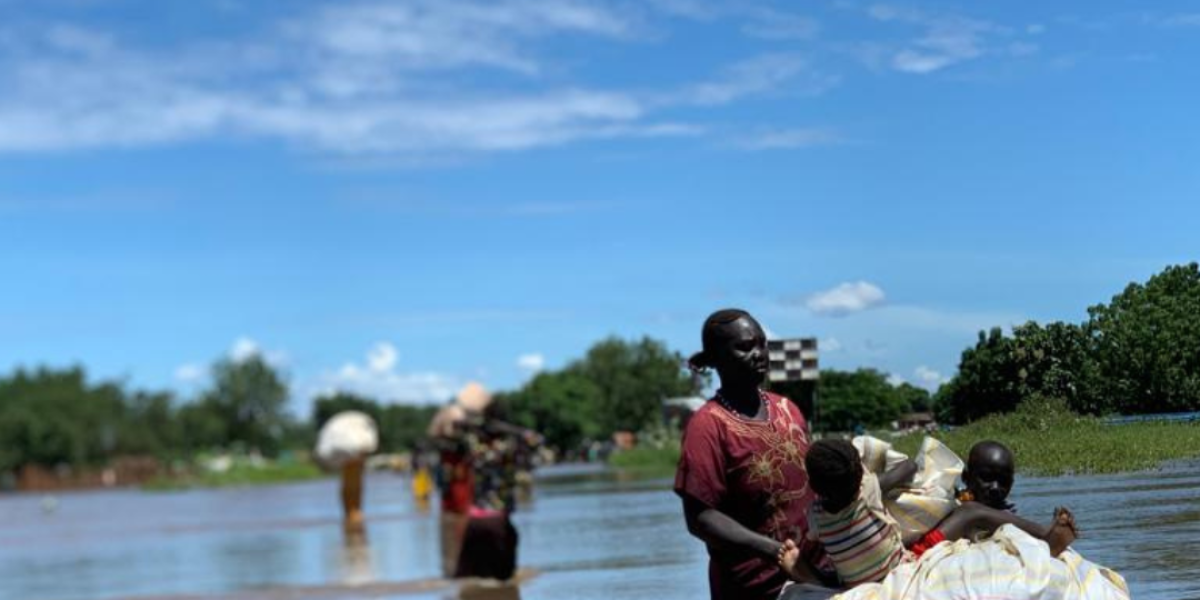Change the Tide: Burundi and South Sudan
19 April 2024|Chloe Gunther

Today, for Change the Tide, we travel to East Africa to hear from community members, leaders, and JRS staff who are working to create more resilience and opportunities for displaced communities in Burundi and South Sudan.
Burundi, with its lush hillsides and agricultural heritage, is in the throes of intense weather-related events induced by climate change. Extensive flooding and intense periods of extreme heat and drought have left the largely agricultural country in a dire socioeconomic and public health situation.
 Despite contributing a mere fraction of global greenhouse gas emissions, the country reels under the weight of environmental disasters.
Despite contributing a mere fraction of global greenhouse gas emissions, the country reels under the weight of environmental disasters.
With agriculture serving as the backbone of Burundi’s economy and livelihood for 80% of its population, the escalating severity and duration of climate impacts have dealt a devastating blow to both the economy and food security.
Most Burundians live along the country’s hillside. In recent years, this has become a danger, and communities now brace themselves for devastating landslides during heavy rainfall.
Not only does Burundi’s geographical location make it more susceptible to climate-related disasters, but the socioeconomic situation also leaves much of the community without the resources or capacity to adapt to intense weather or relocate to safer ground.
Floods strike with devastating speed, inundating villages with rain that can erase homes and livelihoods. In 2020, UNICEF reported that the homes and belongings of 10,000 households were swept away in one night by a torrential downpour.
Amidst this devastation, it’s the children of these communities who particularly bear the brunt of climate-related consequences. Children are more vulnerable to malnutrition, loss of education, and as farmland has turned into fisheries, the risk of water-borne illnesses has drastically increased. 
In the town of Cibitoke, which hosts a large refugee population, Gisoko primary and secondary schools lost two classrooms due to flood damage in early 2023. Two hundred young children were left without a place to learn.
“When a school closes, it is difficult for students to move to new centers or wait months for their school to reopen. This causes many children to drop out from an early age,” said David Nykinza, JRS Coordinator of Education in the Cibitoke Region of Burundi.
Ndaize Speciose, the Director of the Gisoko School said the loss of the two buildings forced teachers to bring more students into their classes, overcrowding the classrooms and lessening the quality of education each child could receive.
With the support of JRS and Education Cannot Wait, Gisoko School started rebuilding the destroyed classrooms in October 2023. Today, these classrooms are functional, and children have been able to return to their classes and continue their studies.
 JRS has since established Environmental Clubs for students and teachers to learn about climate change, the importance of caring for the environment, and strategies they can implement in their communities to mitigate negative impacts from climate change.
JRS has since established Environmental Clubs for students and teachers to learn about climate change, the importance of caring for the environment, and strategies they can implement in their communities to mitigate negative impacts from climate change.
ReliefWeb estimates that 145,183 people have been displaced in Burundi due to climate change and the number is expected to rise as climate-related disasters grow as well.
Burundi is not alone in its struggle. In South Sudan, refugee, returnee, and host communities face similar damage from severe, years-long flooding.
Since the conflict in Sudan broke out in April last year, over eight million people have been displaced, making it the largest situation of forced displacement in the world.
An estimated 560,000 of these refugees have fled to South Sudan and now are dealing with possible secondary displacement as the floods forced families to find drier, higher land.
“Water entered all accommodation rooms and offices. The most affected were the wash facilities: the borehole water pump was submerged in water and all the latrines were full and overflowing,” said the JRS Maban Education Coordinator about a wave of flooding the community endured.
JRS carried out flood response in partnership with local churches and community leaders. JRS also provided essential non-foods items including mosquito nets and plastic sheets to refugees and the host community.
But, like in Burundi, the situation remains dire especially as the wet season begins in South Sudan this April.



